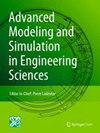减少参数系统模型阶次的后验误差估计
IF 3.2
Q3 MECHANICS
Advanced Modeling and Simulation in Engineering Sciences
Pub Date : 2024-03-11
DOI:10.1186/s40323-024-00260-8
引用次数: 0
摘要
本研究讨论参数系统(包括线性和非线性、时变和稳定系统)模型阶次降低的后验误差估计。我们将重点介绍我们在过去几年中提出的误差估计方法,并将它们与文献中最相关的误差估计方法进行比较。为了更清晰地进行比较,我们将函数空间中提出的一些现有误差边界转换为向量空间 $${mathbb {C}}^n$ 并在 $$\mathbb C^n$ 中提供了相应的证明。我们还探讨了我们提出的误差估计器的一些新见解。此外,我们还回顾了新提出的非线性时间演化系统误差估计器,它适用于由任意时间积分求解器求解的降阶模型。我们最近在多保真度误差估计方面的工作也得到了简要讨论。最后,我们为非线性时间演化系统推导了一个新的无下限常数输出误差估计器。三个实例的数值结果显示了新误差估计器的鲁棒性。本文章由计算机程序翻译,如有差异,请以英文原文为准。
A posteriori error estimation for model order reduction of parametric systems
This survey discusses a posteriori error estimation for model order reduction of parametric systems, including linear and nonlinear, time-dependent and steady systems. We focus on introducing the error estimators we have proposed in the past few years and comparing them with the most related error estimators from the literature. For a clearer comparison, we have translated some existing error bounds proposed in function spaces into the vector space $${\mathbb {C}}^n$$ and provide the corresponding proofs in $$\mathbb C^n$$ . Some new insights into our proposed error estimators are explored. Moreover, we review our newly proposed error estimator for nonlinear time-evolution systems, which is applicable to reduced-order models solved by arbitrary time-integration solvers. Our recent work on multi-fidelity error estimation is also briefly discussed. Finally, we derive a new inf-sup-constant-free output error estimator for nonlinear time-evolution systems. Numerical results for three examples show the robustness of the new error estimator.
求助全文
通过发布文献求助,成功后即可免费获取论文全文。
去求助
来源期刊

Advanced Modeling and Simulation in Engineering Sciences
Engineering-Engineering (miscellaneous)
CiteScore
6.80
自引率
0.00%
发文量
22
审稿时长
30 weeks
期刊介绍:
The research topics addressed by Advanced Modeling and Simulation in Engineering Sciences (AMSES) cover the vast domain of the advanced modeling and simulation of materials, processes and structures governed by the laws of mechanics. The emphasis is on advanced and innovative modeling approaches and numerical strategies. The main objective is to describe the actual physics of large mechanical systems with complicated geometries as accurately as possible using complex, highly nonlinear and coupled multiphysics and multiscale models, and then to carry out simulations with these complex models as rapidly as possible. In other words, this research revolves around efficient numerical modeling along with model verification and validation. Therefore, the corresponding papers deal with advanced modeling and simulation, efficient optimization, inverse analysis, data-driven computation and simulation-based control. These challenging issues require multidisciplinary efforts – particularly in modeling, numerical analysis and computer science – which are treated in this journal.
 求助内容:
求助内容: 应助结果提醒方式:
应助结果提醒方式:


